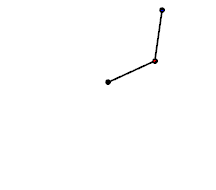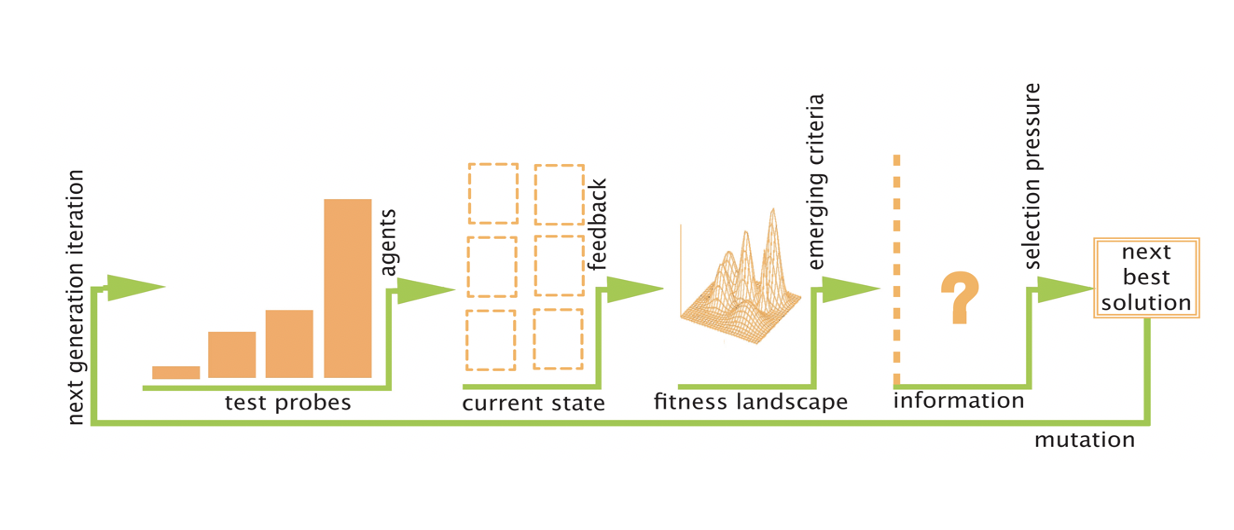We continue by telling people that they can look into the history and learn more about the cartograph. History
Governing FeaturesMaybe a single sentence on the principles with a link to its page. Governing Feature
Urbanism Through the Lens of Complexitywe continue with the shortest intro to the urban fields. Urbanism
Quickly dive into complexity theory and how it can work with urbanism fields through search.
- Variables
- Unfolding Interactions
- The Virtual
- Swarm Behavior
- Stigmergy
- Stabilized Assemblages
- Sensitive to Initial Conditions
- Self Similarity
- Schemata
- Safe to Fail
- Rhizomes
- Requisite Variety
- Redundancy
- Preferential Attachment
- Positive Feedback
- Phase Space
- Perturbation
- Open Scaffolds
- Negentropy
- Negative Feedback
- Multiple Equilibria
- Modularity
- Manifold
- Local Interactions
- Homeostasis
- History Matters
- Fractals
- Fluidity/Mobility
- Fitness Peaks
- Fitness Landscape
- Evolutionary
- Enslaved States
- Tutorials
- Contingency
- Causal Loop Diagrams
- Capturing Flows
- Building Blocks
- Bifurcations
- Arrow of Time
- Affordances
The Virtual
Stabilized Assemblages
Relates to {{Assemblage-Geography}}
Sensitive to Initial Conditions
Rhizomes
All points are interconnected and interdependent, unfolding in a nonlinear manner with no central source of authority.
Requisite Variety
Preferential Attachment
Open Scaffolds
Negative Feedback
Multiple Equilibria
Early versions of systems theory assumed that systems could be 'optimized' to a single condition. CAS analysis assumes that more than one system state can satisfy optimizing criteria, and so the system is able to gravitate to multiple equilibria.
Modularity
History Matters
Fluidity/Mobility
This is relevant to the field of Relational Geography
Fitness Peaks
Fitness Landscape
Enslaved States
An enslaved state can persist as an attractor (see Attractor States) within a Fitness Landscape.
Contingency
Beyond its day-to-day usage, this term used in now employed in the social sciences to highlight the Path Dependency exhibited in many social systems. This is seen to contrast with prior conceptions like "the march of history", which imply a clear causal structure. By speaking about the work as something contingent, it also begs the question of what other "worlds" might have just as equally manifested, had things been slightly different.
Similar ideas are captured in the ideas of Non-Linearity, {{sensitivity-to-initial-conditions}}, History Matters.
Pictured below: the contingent trajectory of the double pendulum:

Causal Loop Diagrams
See also: Causal loop diagram - Wikipedia
Capturing Flows
In geography there has been a move away from thinking about space as a "thing" and to instead think about how different places exist due to how they interact with flows. Places that capture more flows, are more geographically relevant
Building Blocks
The nature of a building block varies according to the system: it may take the form of an ant, a cell, a neuron or a building.
Bifurcations
Affordances
Complex Adaptive Systems theory provides a useful lens with which to understand various phenomena. Keep reading about Complexity
Well this is some nice and text to help us with whatever this should be. Keep reading about Urbanism
Urban FieldsWe continue by telling people that they can look into the history and learn more about the cartograph. People
TermsMaybe a single sentence on the principles with a link to its page. Terms
- Watts & Strogatz
- Warren Weaver
- Vilfredo Pareto
- Thomas Schelling
- Stuart Kauffman
- Stewart Brand
- Steward Pickett
- Stephen Wolfram
- Stephen Marshall
- STEALTH.unlimited
- Stan Allen
- Sergio Porta
- Seewall Wright
- Ross Ashby
- Ron Martin
- Ron Boschma
- Robert May
- Robert Axelrod
- Ricard Solé
- René Thom
- Rem Koolhaas
- Prigogine & Stengers
- Pierre Paul Grasse
- Pierre Belanger
- Peter Sunley
- Peter Allen
- Per Bak
- Paul Torrens
- Patsy Healey
- Ole Jensen
- Norbert Weiner
- Nikos Salingaros
- Nassim Taleb
- Murray Gell-Mann
- Mitchell Feigenbaum
- Mike Lydon & Anthony Garcia
- Mike Batty
- McFarlane & Anderson
- Maturana & Varela
- Martin Prominski
- Manuel de Landa
- Luis Bettencourt
- Ludwig V. Bertalanffy
- Lotka & Volterra
- Koen Franken
- Kim Dovey
- Juval Portugali
- Judith Innes & David Booher
- Josh Epstein and Rob Axtell
- John Von Neumann
- John Urry
- John Protevi
- John Holland
- John Habraken
- John Conway
- Jeremy Till & T. Schneider
- Jean Hillier
- Jason Dittmer
- James Corner
- Jack Ahern
- Itzhak Benenson
- Ignacio Farias
- Hermann Haken
- Herbert Simon
- Henry Wai-chung Yeung
- Henri Poincare
- Heinz Von Foerster
- Gregory Bateson
- George Kingsley Zipf
- Georg Cantor
- Geoffrey West
- Eric Sheppard
- Eric Bonabeau
- Erik & Ronald Rietveld
- Edward Norton Lorenz
- Doreen Massey
- D'Arcy Wentworth Thompson
- Conrad Waddington
- Claude Shannon
- Chris Langton
- Charles Waldheim
- Charles Darwin
- C. S. Holling
- Brian Berry
- Besim Hakim
- Bernhard Riemann
- Benoit Mandelbrot
- Ben Hamouche
- Ash Amin & Thrift Nigel
- Alejandro Aravena
- Albert Laszlo Barabasi
- Alan Turing
- Variables
- Unfolding Interactions
- The Virtual
- Swarm Behavior
- Stigmergy
- Stabilized Assemblages
- Sensitive to Initial Conditions
- Self Similarity
- Schemata
- Safe to Fail
- Rhizomes
- Requisite Variety
- Redundancy
- Preferential Attachment
- Positive Feedback
- Phase Space
- Perturbation
- Open Scaffolds
- Negentropy
- Negative Feedback
- Multiple Equilibria
- Modularity
- Manifold
- Local Interactions
- Homeostasis
- History Matters
- Fractals
- Fluidity/Mobility
- Fitness Peaks
- Fitness Landscape
- Evolutionary
- Enslaved States
- Tutorials
- Contingency
- Causal Loop Diagrams
- Capturing Flows
- Building Blocks
- Bifurcations
- Arrow of Time
- Affordances
Navigating Complexity brings in a wealth of resources and related content associated to the topics and terms. You can see all of them sorted by type.
The site features a system for the submission and evaluation of explanatory diagrams relating to a variety of CAS topics.
Crowdsourcing Diagrams
A new way to explore the content in an interactive dashboard of all topics in this site.
Complexity Explorer
Navigating Complexity is a platform for learning about complex adaptive systems and how they apply to the built environment.
The AuthorSharon has been involved in complexity research for over 20 years, and is the developer of the overall website content and content structure. Learn more about Sharon
Site StewardsSpecific components of the site are generously managed by a Site Stewards, working to keep the content fresh and accurate. Site Stewards
